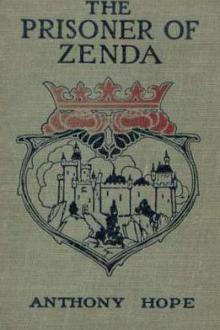The Prisoner of Zenda, Anthony Hope [self help books to read txt] 📗

- Author: Anthony Hope
Book online «The Prisoner of Zenda, Anthony Hope [self help books to read txt] 📗». Author Anthony Hope
“Then we come to this,” pursued Sapt: “‘Madame de Mauban, whose movements have been watched according to instructions, left by train at midday. She took a ticket for Dresden—‘”
“It’s an old habit of hers,” said I.
“‘The Dresden train stops at Zenda.’ An acute fellow, this. And finally listen to this: ‘The state of feeling in the city is not satisfactory. The King is much criticized’ (you know, he’s told to be quite frank) ‘for taking no steps about his marriage. From enquiries among the entourage of the Princess Flavia, her Royal Highness is believed to be deeply offended by the remissness of his Majesty. The common people are coupling her name with that of the Duke of Strelsau, and the duke gains much popularity from the suggestion.’ I have caused the announcement that the King gives a ball tonight in honour of the princess to be widely diffused, and the effect is good.”
“That is news to me,” said I.
“Oh, the preparations are all made!” laughed Fritz. “I’ve seen to that.”
Sapt turned to me and said, in a sharp, decisive voice:
“You must make love to her tonight, you know.”
“I think it is very likely I shall, if I see her alone,” said I. “Hang it, Sapt, you don’t suppose I find it difficult?”
Fritz whistled a bar or two; then he said: “You’ll find it only too easy. Look here, I hate telling you this, but I must. The Countess Helga told me that the princess had become most attached to the King. Since the coronation, her feelings have undergone a marked development. It’s quite true that she is deeply wounded by the King’s apparent neglect.”
“Here’s a kettle of fish!” I groaned.
“Tut, tut!” said Sapt. “I suppose you’ve made pretty speeches to a girl before now? That’s all she wants.”
Fritz, himself a lover, understood better my distress. He laid his hand on my shoulder, but said nothing.
“I think, though,” pursued that cold-blooded old Sapt, “that you’d better make your offer tonight.”
“Good heavens!”
“Or, any rate, go near it: and I shall send a ‘semi-official’ to the papers.”
“I’ll do nothing of the sort—no more will you!” said I. “I utterly refuse to take part in making a fool of the princess.”
Sapt looked at me with his small keen eyes. A slow cunning smile passed over his face.
“All right, lad, all right,” said he. “We mustn’t press you too hard. Soothe her down a bit, if you can, you know. Now for Michael!”
“Oh, damn Michael!” said I. “He’ll do tomorrow. Here, Fritz, come for a stroll in the garden.”
Sapt at once yielded. His rough manner covered a wonderful tact—and as I came to recognize more and more, a remarkable knowledge of human nature. Why did he urge me so little about the princess? Because he knew that her beauty and my ardour would carry me further than all his arguments—and that the less I thought about the thing, the more likely was I to do it. He must have seen the unhappiness he might bring on the princess; but that went for nothing with him. Can I say, confidently, that he was wrong? If the King were restored, the princess must turn to him, either knowing or not knowing the change. And if the King were not restored to us? It was a subject that we had never yet spoken of. But I had an idea that, in such a case, Sapt meant to seat me on the throne of Ruritania for the term of my life. He would have set Satan himself there sooner than that pupil of his, Black Michael.
The ball was a sumptuous affair. I opened it by dancing a quadrille with Flavia: then I waltzed with her. Curious eyes and eager whispers attended us. We went in to supper; and, half way through, I, half mad by then, for her glance had answered mine, and her quick breathing met my stammered sentences—I rose in my place before all the brilliant crowd, and taking the Red Rose that I wore, flung the ribbon with its jewelled badge round her neck. In a tumult of applause I sat down: I saw Sapt smiling over his wine, and Fritz frowning. The rest of the meal passed in silence; neither Flavia nor I could speak. Fritz touched me on the shoulder, and I rose, gave her my arm, and walked down the hall into a little room, where coffee was served to us. The gentlemen and ladies in attendance withdrew, and we were alone.
The little room had French windows opening on the gardens. The night was fine, cool, and fragrant. Flavia sat down, and I stood opposite her. I was struggling with myself: if she had not looked at me, I believe that even then I should have won my fight. But suddenly, involuntarily, she gave me one brief glance—a glance of question, hurriedly turned aside; a blush that the question had ever come spread over her cheek, and she caught her breath. Ah, if you had seen her! I forgot the King in Zenda. I forgot the King in Strelsau. She was a princess—and I an impostor. Do you think I remembered that? I threw myself on my knee and seized her hands in mine. I said nothing. Why should I? The soft sounds of the night set my wooing to a wordless melody, as I pressed my kisses on her lips.
She pushed me from her, crying suddenly:
“Ah! is it true? or is it only because you must?”
“It’s true!” I said, in low smothered tones—“true that I love you more than life—or truth—or honour!”
She set no meaning to my words, treating them as one of love’s sweet extravagances. She came close to me, and whispered:
“Oh, if you were not the King! Then I could show you how I love you! How is it that I love you now, Rudolf?”
“Now?”
“Yes—just lately. I—I never did before.”
Pure triumph filled me. It was I—Rudolf Rassendyll—who had won her! I caught her round the waist.
“You didn’t love me before?” I asked.
She looked up into my face, smiling, as she whispered:
“It must have been your Crown. I felt it first on the Coronation Day.”
“Never before?” I asked eagerly.
She laughed low.
“You speak as if you would be pleased to hear me say ‘Yes’ to that,” she said.
“Would ‘Yes’ be true?”
“Yes,” I just heard her breathe, and she went on in an instant: “Be careful, Rudolf; be careful, dear. He will be mad now.”
“What, Michael? If Michael were the worst—”
“What worse is there?”





Comments (0)